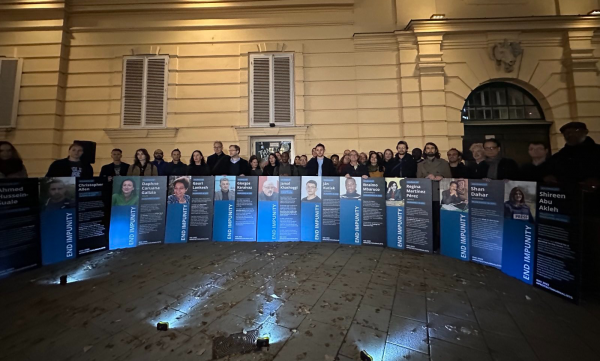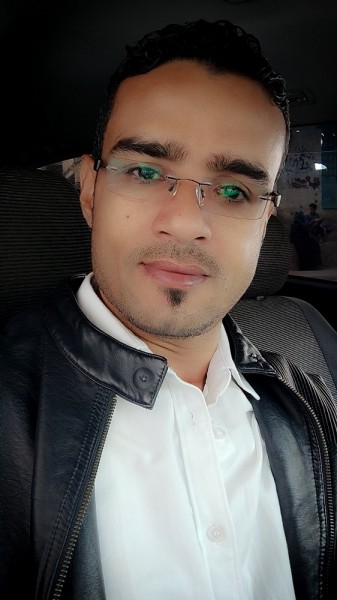A new coalition government is in place as Yemenis prepare for elections next month, which has been some cause for some optimism. Two Yemeni chief editors told IPI they were hopeful that nascent reforms within state media and the recent appointment of a new information minister, Ali al-Amrani, could herald overall improvements for the media community.
Journalists nonetheless remain wary. Demonstrations, most recently against a law that will provide immunity to the president and members of the old regime, continue to be met with deadly violence. Reporters and cameramen covering the protests and clashes that began in early 2011 have repeatedly been attacked and arrested. Six journalists lost their lives in the violence last year, according to IPI’s Death Watch.
“Journalists are still afraid, because they know about the backlash from security,” said Hakim Almasmari, chief editor of the Yemen Post. “Because of the turmoil, people are afraid of assassins and kidnappings.”
Throughout the revolution, state media presented biased coverage of the demonstrators, calling them criminals, and played down the violent repression of the protests. Journalists told IPI that this was now changing, with journalists at some state media demanding reform – with the political support of the vice president and the new information minister.
“Al Thawra newspaper is the mouthpiece of the government; that was completely changed from the top to the bottom, Yemen’s TV channels too,” Almasmari said. He added: “The information minister is a credible person, and with that there is hope that media is heading in the right direction.”
But in some cases, their efforts have resulted in a backlash, reports said.
Since the start of the year, journalist Ali al-Harazi of 26 September, an army weekly, has reportedly received death threats as a result of his protests against the former editor, who has now been replaced, the Yemeni Journalists’ Syndicate (YJS) said in a statement.
Staff at the official newspaper 14 October and at 26 September held protests and strikes late last year, demanding that the papers’ chief editors, who are seen as being close to the ruling family of President Ali Abdullah Saleh, be removed, YJS reports said. YJS said that in response, the newspapers’ staffs had faced dismissal, threats and physical attacks.
Speaking of the latest repercussions against journalists at 26 September, Almasmari said, “[26 September’s former chief editor, General Ali Hassan al-Shater] was changed; after that, they tried to retaliate against those who had called for a free and credible media at the newspaper and tried to cut their salaries, benefits, interests in revenge.”
But change is nonetheless underway, for both government and private media, Almasmari and Yemen Times editor Nadia al-Saqqaf told IPI.
“I am very optimistic and believe the best is to come,” Al-Saqqaf said, adding that the biggest challenge in reporting the upcoming elections would be getting enough journalists out to cover it. “We had to let go of people because of the economic difficulty caused by the uprising, but in terms of security, I really don’t think covering the elections would be a problem.”
The Yemen Times reported on Sunday that Minister al-Amrani had received anonymous death threats as a result of his contributions to the process of reform. Al-Amrani had been an MP with the President’s party since 1993, but defected in March 2011 to join the revolutionaries, an early decision that now gives him credibility among those sympathetic to the cause.
According to al-Saqqaf, the minister intends to “free radio and TV from the state monopoly, which opens the door for private stations, and also to allow foreign journalists to enter the country and report freely after they were prevented”. But, al-Saqqaf warned that progress would be slow: “[T]his is a process that would take time, since he is trying to change a three decades-old way of working.”
Since the uprising in Yemen began last year, journalists – who were already subject to censorship and attacks under the regime of President Saleh – have been further endangered by a climate of lawlessness and impunity. Those who set out to cover anti-regime protests and the crackdown against them were targeted by snipers and security forces. Media houses struggled with a lack of electricity and other basic services, and still do.
Media and media workers continue to be prosecuted.
A journalist with News Yemen website, Abdulkarim Thuaeel, spent 36 days in detention and was released three weeks ago on bail, YJS and al-Saqqaf told IPI. According to YJS research, Thuaeel is from the Arhab tribe in northern Sanaa, and was arrested for taking pictures of clashes between Arhab and the Republican Guard for Al Jazeera without a license.
Nasser Al-Dhubaibi, the editor of a new weekly newspaper, Al-Hurra, spent nearly a month in detention before being released on 11 January, YJS quoted al-Dhubaibi as saying. Al-Hurra began publication in late 2011. Al-Dhubaibi told YJS that he was picked up by a military vehicle, blindfolded and eventually questioned about the paper’s sources of funding and relationship to the Houthis, an insurgent group in the North that has been struggling against the central government for many years, and which is currently aligned with the revolutionaries.
The editor-in-chief and others from Al-Ayyam newspaper, which was banned in 2009 and whose premises were besieged by security forces in 2010, are still on trial for alleged crimes committed at that time, including “forming a gang”, the Committee to Protect Journalists (CPJ) reported this week. But according to CPJ’s review of court documents, even two of the prosecution’s witnesses testified in favour of the defendants during a hearing last month.
“We are heartened to hear that journalists are beginning to see some light at the end of the tunnel, but continue to be concerned by the reports of threats, attacks and criminal prosecution of the media,” said IPI Press Freedom Manager Anthony Mills. “We urge the Yemen government to implement reforms with the aim of allowing a free and vibrant media that serves the public, not the government, and which can operate without fear of censorship or attack.”


